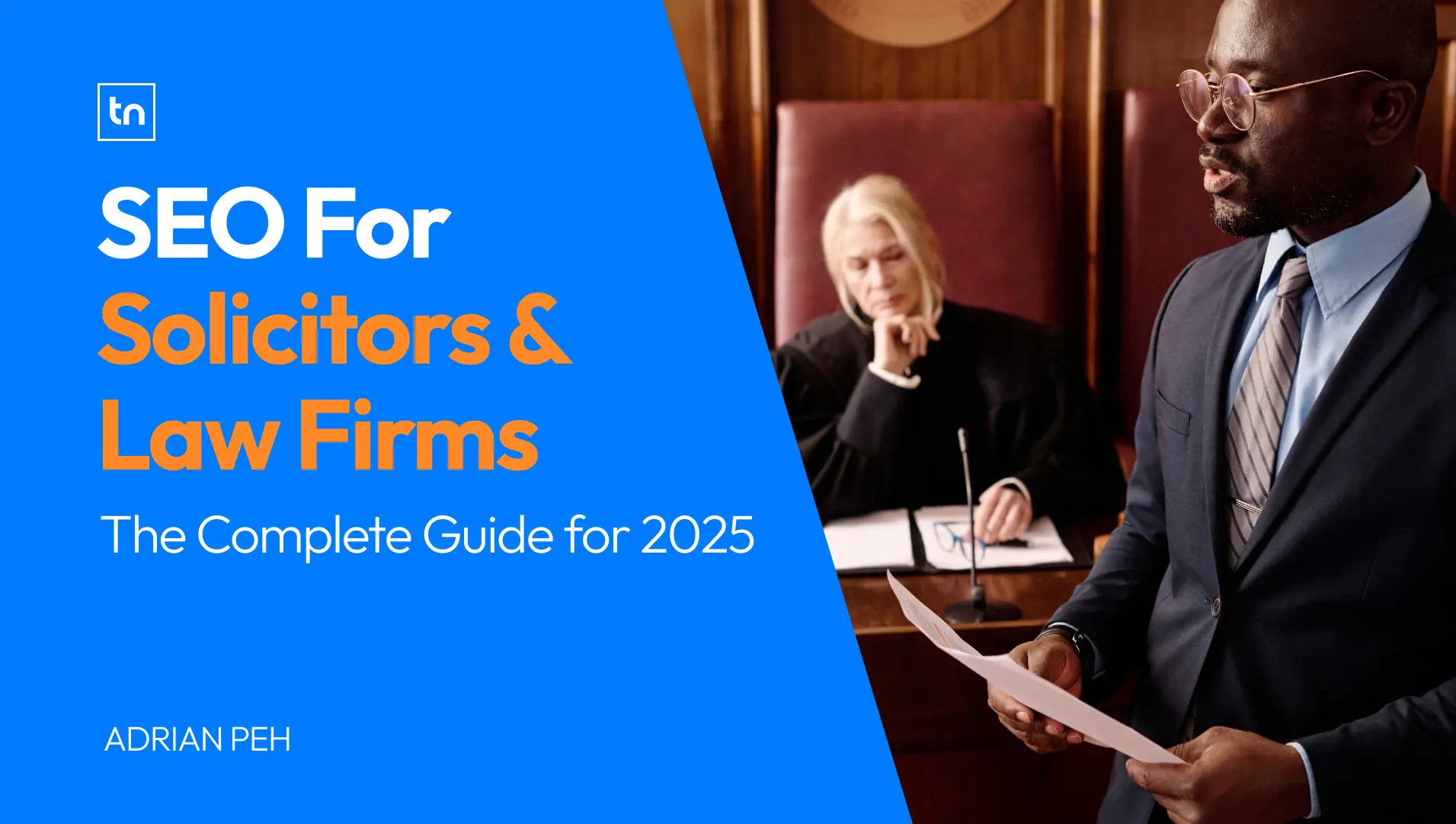Table of Contents
As an ambitious solicitor looking to stay competitive in today’s digital world, you already know how crucial it is to rank well on search engines. After all, that’s where potential clients turn when they need legal help.
We’ve seen a drastic increase of online users across the UK in 2024, and this is only expected to go up in 2025. Old-style marketing doesn’t work as well as it used to, that’s why most solicitors and law firms now focus on digital marketing such as SEO, social media and video creation.
I’m not an expert in video creation, but I know how SEO for solicitors work. I wrote this guide to share valuable insights based on research and years of experience to help you understand SEO and give you actionable tips that you can use today to prepare your law firm’s website for 2025.
I’ve also added a step-by-step SEO strategy for solicitors at the end of this article to help you kickstart your SEO journey. Let’s dive in!
What is SEO for Solicitors, and why is it important in 2025?
SEO for solicitors is getting your website pages to rank higher in search results and generate more leads. In other words, when potential clients search for terms like “family law solicitors” or “immigration solicitors near me”, your web page stands out from the rest of your competitors, increasing visibility, web traffic and revenue.
According to growlawfirm.com, 50% of law firms and solicitors already use SEO as a primary marketing channel. This means two things for you:
- There are a lot of untapped opportunities for solicitors and law firms to win higher rankings on search engines.
- Some of your competitors already know that SEO is crucial in 2025, and they are actively working on it to win the race to the top 5 positions on Google.
If your law firm does not rank well on search engines like Google or Bing, it’s time to consider investing 8-10 hours of your time every week to improve that. Alternatively, if you need help with SEO, you can learn more about our SEO services here.

Key Benefits of SEO for Solicitors
The demand for legal advice online grew exponentially in 2024 and ambitious law firms and solicitors need SEO to remain competitive in 2025. A tailored SEO strategy will boost your chances of getting top search results from Google and reap the rewards. The main benefits for solicitors are:
- Increased Visibility: A well-optimised website ensures your law firm appears on the first page of search results when potential clients search for legal services. Even better, when your website has been nurtured correctly, your pages will rank between positions 1 and 5 over time, which results in more eyeballs for your business.
- Targeted Traffic: Using relevant keywords can attract potential clients who need your services in specific practice areas. Another significant benefit is that you can target precisely people who are ready to call you right now, meaning if you rank in the top positions for those keywords, your phone will be ringing non-stop.
- Cost-Effective Marketing Strategy: Compared to paid ads, good SEO provides long-term results and sustainable growth over time. With that said, you can rank organically for keywords that cost £15+ per click, meaning you will be getting that traffic for free.
- Builds Trust and Credibility: When your website ranks high in search results, people tend to trust you more. This is especially true if you rank for specific questions like “Do I need a divorce solicitor, or can I handle my divorce without one?” or “How can a divorce solicitor help with child custody and financial settlements?”
The more people rely on your free advice online, the more likely they will call you when they need legal help.
How Long Does It Take For Solicitors and Law Firms to See Results From SEO?
This is a common concern among law firm owners and solicitors. Typically, it takes 4 to 12 months to see results from an SEO campaign. However, this timeline isn’t guaranteed, as the outcome depends on factors such as the type of law you practice, your location, competition, website size, and the general condition of your site. Here’s what you can expect during the process:
- Stage 1: The initial goal is to establish strong SEO fundamentals. This includes developing a solid strategy, indexing all existing pages on Google, and ensuring your site is technically sound.
- Stage 2: At this stage, success is defined by achieving higher rankings, increasing impressions, and indexing additional pages.
- Stage 3: This is where you begin attracting visitors to your website. At this point, you’ll analyse visitor behaviour and see whether they request quotes or call your office. If not, you can identify obstacles and optimise your pages for conversions.
As mentioned earlier, reaching Stage 3 can take 4 to 12 months. However, once you reach this point, your small business SEO strategy is well-established. You’ve built strong topical authority, generated quality backlinks, and identified what works best for your customers. From here, you can expect a consistent flow of leads as you continue working on your SEO.

Keyword Research For Solicitors and Law Firms
An essential part of optimising your law firm’s website to rank is understanding the keywords your potential clients use to search for legal services. Keyword research helps you identify search terms like “divorce solicitor in London” or “personal injury lawyer“. Find more information about keyword research for solicitors here.
How To Find The Right Keywords
- Use SEO Tools: Tools like Ahrefs and SEMrush can help you with every aspect of your SEO, including keyword research. You can run a competitor analysis to find out what search terms other law firms use and discover easy-to-rank terms with low KD (keyword difficulty) and 40+ monthly searches. This is a great starting point.
- Focus on Practice Areas: Target specific terms, such as “immigration solicitors” or “family law expert”.
- Consider Local Keywords: Add location-based phrases like “criminal solicitor Manchester” to attract local clients.
- Use Long-Tail Keywords: These keywords are often easier to rank for and have a reasonable search volume. An example of a long-tail keyword is “cost of immigration solicitor advice“. In comparison, a short keyword would be “immigration solicitor“.
By including targeted keywords across your website, you can optimise it to attract relevant traffic interested in your legal advice and ready to contact you. Add a mix of all search terms (location-based, service-based, informational/legal advice) and create associated pages to structure your site.
Let me now take you through the On-page optimisation process.
On-Page SEO: Optimising Your Law Firm’s Website
On-page SEO is improving individual pages and the entire website structure to make it easier for visitors to navigate and for Google to understand your content. Now, let’s break down each aspect.
Optimise Meta Titles and Meta Descriptions
Write clear, keyword-optimised meta titles and descriptions that describe your services and encourage users to click. Add your target keyword to both sections to help Google understand how your page relates to it.

Create Service-Specific Pages
Ensure each service page focuses on specific legal services, like “personal injury law” or “public liability accident claims”. Ideally, only your “Home Page” should have all the different services you provide, or you can create another page like “Our Services“.

Use Heading Tags
Use H1, H2, H3 and H4 headings to structure content and improve readability. I advise keeping your content concise, without too much fluff, and keeping the heading structure up to H4. In rare cases, you need to go up to H6, but don’t forget that the more headings you add, the better you need to plan the page structure because Google might not understand it if it’s too complex.

Create Location-Specific Pages
Create informative pages about each location you directly serve with keywords like “family law solicitor in Birmingham” or “personal injury solicitors in Manchester.” I recommend creating location-specific pages based on the information you’ve provided in your Google Business Profile. This helps Google’s crawler relate to and verify the information on your website.

Develop a Clear Site Structure
Think of your website as a pyramid. Your “Home Page” is at the top and gradually expands into more pages. For example, your “Home Page” links directly to the “Personal Injury” page, which links to “Road Traffic Accident Claims” and “Industrial Disease Claims.”
This helps build topical authority, a very important ranking factor in SEO for law firms.
Let’s now look at the technical aspect of your SEO.

Technical SEO: Ensuring Your Law Firm’s Website Runs Smoothly
Technical SEO ensures that search engines can efficiently crawl, index, and rank your website. Key technical SEO tips for solicitors include:
- Website Speed: Optimise your law firm’s website to load quickly, as slow sites harm user experience and rankings. Google and your potential clients prefer desktop and mobile sites that load faster than 3 seconds. If it takes longer, the chance of losing the person who clicked on your site grows by 20% every other second.
- Mobile Optimisation: Ensure your site works perfectly on mobile devices, as Google prioritises mobile-friendly websites. This includes, but is not limited to, the size of your text (is it easy to read, or do people have to pinch the screen to zoom in) and the distance between clickable elements such as CTAs or social media buttons.
- Fix Broken Links: Check for broken links or outdated pages that could harm SEO performance and user experience. You might say, “Well, if it’s a broken link, people will reach the 404 page and return to the home page.” No, that’s not right. Your visitor will be gone from your website.
There a plugins on WordPress like AIOSEO (All in one SEO) that can help you discover broken links or you can manually click on every clickable element on your page and see whether it ends up found or at a 404. - Schema Markup: Use structured data to help search engines understand your legal services, enhancing visibility. Creating a schema markup is a bit more technical, and there are different schema markups for each type of page. You can read more about how to create a schema markup on schema.org.
I recommend running a complete site audit before starting any on-page optimisations or keyword research to find all technical errors. Once you’ve fixed the most critical ones, you can leave the rest and fix them as you go.
Best Approach to Local SEO for Solicitors in 2025
Local SEO is critical for solicitors, as most clients seek legal help within their geographical area. Searches like “divorce solicitors near me” are considered local searches. Here are some tips that will help you boost your local rankings:
- Create a Google Business Profile (formerly GMB): Create and optimise your free Google Business Profile. When you access your account, you must complete all information about your business, including name, phone, address, service areas, types of services, and images. To compete with others, you should have a 100% completed profile.
If you are a solicitor based in London and practice immigration law, include both in your profile name. For example, “Immigration Solicitor in London” or “Immigration Solicitor/Lawyer in London—[Name of law firm].” - Build Pages For Specific Locations: I’ve already mentioned the importance of location-specific pages in the On-page SEO section above, but this is a crucial factor for local SEO for solicitors, and I’m mentioning it again. Create pages targeting locations like “solicitors in Birmingham” or “legal services in Manchester”. This works very well with your GBP. Here’s how to properly optimise your Google Business Profile for maximum results.
- Use Local Directories: List your firm or practice in as many local directories as possible and ensure that your NAP (Name, Address, Phone) information is the same, without compromise. This sends strong signals to Google that you are a legitimate business. Also, list your business at Law Society, Yell, or Thomson Local.
- Ask Customers For Reviews: Even if you’ve nailed the rest of the local SEO factors for solicitors, you’ll still struggle to rank in the top positions if you lack reviews. Always ask happy customers to leave reviews; don’t get discouraged when your competitors have 1000+ reviews. They’ve been in the SEO space for 10+ years.
My advice is to start from your Google Business Profile. Once you’ve optimised that, keep a record of your NAP file handy and start listing your site on local directories. You need 30-50 listings, and then you can move on with your additional pages and partnership strategies.

SEO Content For Law Firms: What Should You Write About?
High-quality law firm SEO content helps boost rankings and attract potential clients. The more original and personal your content, the more people will appreciate and trust you. Here’s what you should focus on:
- Service Pages: Create pages for every legal service you specialise in, for example, “Family and Divorce“, “Employment“, etc. These pages will often be your money-makers, so ensure the content is detailed and concise. Use trust-building techniques like adding reviews and trust badges.
- Blog Posts: Write informative articles answering common legal questions, such as “How to file for divorce in the UK.” If you create an Evergreen article and rank it in the top position of Google, it will turn into a gold mine.
How do I know? Twelve months ago, I wrote an article that ranked number one in Google searches for two specific keywords. This brings 20-30 leads for my client every month. - FAQs: Address frequently asked questions clients may have about your services. This can be added to each service page or created as an explicit page to answer common questions. Not only does this help with trust-building, but it also helps with objection handling before the actual phone call.
Publishing valuable SEO content positions your law firm as an authority while improving rankings on search engines. If you want to give value through your content and write engaging SEO articles and guides that make people read, avoid using AI-generated text.
Link Building: Why Backlinks Matter for Solicitors?
Link building involves acquiring high-quality backlinks from other websites. Providing advice as a Solicitor online can directly impact people’s lives. Here’s why Google doesn’t trust every other website called “Best Solicitors in the UK.” Google needs to trust you first before boosting your content.
Backlinks act as votes of confidence that improve your SEO rankings. In simple terms, a backlink is a link to your website from another site.
Link-Building Strategies for Solicitors
- Get Links From Directories: Often, they provide “do-follow” links, but mainly “no-follow”. However, you need to have a mix of both. Only “do-follow” links would look spammy, and Google might penalise your website in the long run.
- Write Guest Posts: Write articles for legal or business websites. This ensures that other sites related to your industry that are highly relevant link back to yours. Also, it allows you to write your articles and include your links within the proper context.
- Utilise Digital PR: Write press releases about your firm so media outlets like Forbes can link to your website. You can also build relationships with journalists and bloggers. Here’s a helpful guide about Digital PR if you want to learn more.
- Buy Backlinks: You can pay to get quality backlinks to your site. However, I don’t recommend that unless you acquire them from an authoritative site related to your industry. Otherwise, it could hurt your rankings in the long run.
- Create a Free Online Tool: Develop a free online tool that helps people solve a problem. For example you can use ChatGPT to create an Workplace Compensation & Benefits Calculator which helps employees calculate their compensations and benefits in the workplace (e.g., severance pay, overtime pay, redundancy).
Many employees are unsure of their rights, and having a calculator on your website could be a go-to resource for both individuals and HR-related websites which ultimately helps with link-building.
Btw, I’ve seen 100s of websites for solicitors and law firms and never seen that tool before, so it might be a good idea to consider it.
Quality backlinks signal to search engines that your law firm website is credible and deserves a high ranking. On the flip side, bad-quality ones signal that your site is not trustworthy. Focus on quality first, and quantity will come after.

SEO Audit: A Site Health Check for Solicitors and Law Firms
An SEO audit is essential for identifying areas of improvement. A client of mine asked me to identify why his rankings dropped suddenly and some pages were not indexed on Google. I did a thorough SEO audit and found that my client’s last SEO agency intentionally added a code to block the website from indexing on Google.
To avoid similar problems, here’s how to evaluate your law firm’s SEO performance:
- Site Health Check: Use tools like SEMrush to check for technical issues. The report will highlight all critical errors directly impacting your SEO performance.
- Crawlability and Indexability: Find out if Google is allowed to crawl your website. If not, Google will never be able to index it.
- Content Analysis: Ensure your pages are optimised with relevant keywords.
- Backlink Review: Evaluate your current backlinks and identify growth opportunities.
My recommendation is to run comprehensive SEO audits every three months. They take 2-5 hours to ensure that you examine every aspect and analyse it, but knowing your site is sound is suitable for having peace of mind.

Do you want a free SEO audit for your website?
SEO Strategy for Solicitors and Law Firms in 2025
Your law firm’s SEO strategy is the most crucial aspect of SEO, and you have to be consistent, without compromise, to see actual results. Let me take you through the exact process that I’d follow in 2025:
- Start with a thorough Site Audit: Consider it as if you go to the doctor. Before any treatment is advised, the doctor asks you about your symptoms. Before optimising content, you must perform a site audit to determine your website’s technical and SEO state.
- Technical fixes: Review your site’s technical errors and fix as many as possible. I recommend hiring a technical SEO expert to avoid problems if something needs to be adjusted at the back end.
- Competitor analysis: Find out about all of your direct competitors. Analyse their website structure and page layouts and see what they are doing to be successful. I recommend going through their “buyer journey” process to understand how they do it.
- Keyword research and analysis: Use SEO tools like SEMrush or Ubbersuggest to find keywords related to your industry. But don’t just guess what the words could be. You need to navigate to the keyword research tab on SEMrush and find what your competitors are ranking for.
They’ve already done the hard work for you. You must list all legal SEO search terms with low competition and 40+ monthly search volumes. - On-page SEO: Now that you’ve discovered all the keywords you want to rank for, you need to optimise your existing pages for matching terms. For example, if you find a search term about “Legal Personal Injury Advice Manchester” and have a page related to this service, you can optimise it. Don’t forget to add the keyword in your H1 title, meta title, and meta description; this is crucial for SEO.
- Create a content planner: Make a content planner to be consistent throughout the SEO campaign. Aim for at least two pieces of weekly content and track your site’s performance. Over time, this will bring traffic to your website.
- Optimise your Google business profile: Create a Google Business Profile and add relevant information about your law firm, such as Name, Address, Phone number, Email, Website link, Logo, Images and types of services you offer. Save a NAP file (Name, Address and Phone).
- Directories Listings: Use the NAP file you created and list your website in as many local directories as possible. The NAP information must always be the same; this is crucial!
- Acquire quality backlinks: Set a goal of 1-2 per month and try to stick to it. This is one of the most critical factors in SEO for lawyers for 2025.
A long-term SEO strategy for your law firm helps you grow sustainably and stay ahead of competitors in search engine rankings. The steps I’ve listed above might seem like a lot, but one step at a time goes a long way!
Here you can check the SEO prices for UK with our comprehensive guide.
Conclusion: SEO for Solicitors
SEO is a powerful tool for solicitors and law firms that helps them stand out in an increasingly competitive online marketplace. Your firm can attract targeted traffic and connect with potential clients by implementing effective keyword research, improving on-page and technical SEO, and focusing on local SEO strategies.
Consistent content creation, link building, and regular SEO audits are key to long-term success. Start optimising your law firm’s website today to ensure clients searching for your services can find you quickly and trust you as the legal expert they need.
FAQs
From £500 – £10,000+ per month based on your law firm’s needs and goals. For example, if you are a solo practitioner, you will lean toward the lower price range, whereas if you have a firm with 10+ practitioners, you might need faster results and more clients, therefore leaning towards the higher price range.
What is an SEO lawyer?
SEO (search engine optimisation) for lawyers refers to the digital marketing strategies used to improve the quality of your law firm’s website so that it ranks higher on Google. By higher quality, we don’t emphasise design but anything related to improving the user experience to bring you more traffic and leads.
What is SEO in law?
SEO (Search Engine Optimisation)
A Law firm’s website has to be optimised in a certain way and nurtured over time to come up in search results and generate business. This is where search engine optimisation (SEO) comes in.
Why Local SEO is essential for law firms?
Local SEO increases your firm’s visibility to over 97% of potential clients searching online for nearby lawyers and solicitors. Coming up in local searches ultimately tells people you are trustworthy and are more likely to contact you.










